Sandra Beasley's Blog, page 19
October 6, 2011
Updates & Coming Up
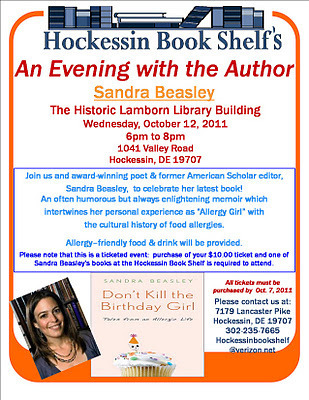 Delaware-ans! Join us at the Lamborn Library on Wednesday, October 12 for an event supporting the local & independent Hockessin Book Shelf. I'll be sharing excerpts from Don't Kill the Birthday Girl, and we'll enjoy wine and food free of the Big 8 allergens (not to mention really tasty...I've seen the menu). If you have friends in the area affected by allergy--or fans of literary memoir--please spread the word. They are asking folks to secure tickets by Friday, October 7. You'll find more info on Hockessin Book Shelf's Facebook page.
Delaware-ans! Join us at the Lamborn Library on Wednesday, October 12 for an event supporting the local & independent Hockessin Book Shelf. I'll be sharing excerpts from Don't Kill the Birthday Girl, and we'll enjoy wine and food free of the Big 8 allergens (not to mention really tasty...I've seen the menu). If you have friends in the area affected by allergy--or fans of literary memoir--please spread the word. They are asking folks to secure tickets by Friday, October 7. You'll find more info on Hockessin Book Shelf's Facebook page. This will be the first event in a whirlwind week of book-tour for me. From Delaware it is on to Kripalu Yoga Center in the Berkshires (Thursday, Oct. 13); from there it is on to two panels (!) at the Boston Book Festival (Saturday, Oct. 15); from there it is on to Fairfield Public Library in Connecticut (Sunday, Oct. 16). Each venue should bring its own unique audience, and I suspect I'll be switching up my DKTBG selections to suit.
While I'm beating the drum of self-promotion, I'll mention that I did a guest post over at the Lofty Ambitions site, which runs pieces on theme with "Aviation, Science, and Writing as a Couple." I don't have much to say on the latter (unless writing as both a poet and a memoirist counts as a "couple"), but I was thrilled to have the opportunity to share some backstory on my grandfather--who was a doctor assigned to NASA's Project Mercury flights--and how his influence shaped my approach to writing about medical matters in the memoir. A brief snippet:
My grandfather and his colleagues were charged with patients who, by definition, were adventurers of the greatest extreme. As doctors, they tracked the pulses. They counted the heartbeats. They took the temperatures. They had to constantly push the astronauts toward self-inspection. How do you feel? Can you continue?
You can read the whole post here.
...Before we shimmy into October, I want to reach back for September highlight: while in Decatur for their book festival, I got to sit down with Jake Adam York and be intereviewed for the Southern Spaces "Poets in Place" series, which resulted in a quartet of short videos on everything from how my Virginia heritage surfaces in my poetry, to how food allergies intersect with culinary tradition, to the experience of making long and frequent drives from DC to Mississippi. I can't begin to say how honored I was to become a part of this interdisciplinary journal's site, which is an amazing resource for students looking at contemporary Southern literature. Other poets in the series include Dan Albergotti, Natasha Trethewey, Jericho Brown, and Claudia Emerson.
These have been quiet days, which means these have been creative days. Sure, I've written things here and there in the past year--particularly on solicitation & on deadline--but this is the first month in ages that I have felt the organic hum of drafting, revising, sending out, making notes, drafting some more. I was trying to explain it to someone the other evening and I said "I thought it was enough to make time to write. But actually, I needed to make time to waste time. And then to write in the time after that." There will surely be some stumbles and rejections in the coming days, and false starts, and nights spent worrying over money, but I also have the fundamental security of knowing: whatever the next book will be, there will be a next book.
Back on the horse.
Published on October 06, 2011 08:38
October 3, 2011
Writer's Market & Poet's Market 2012
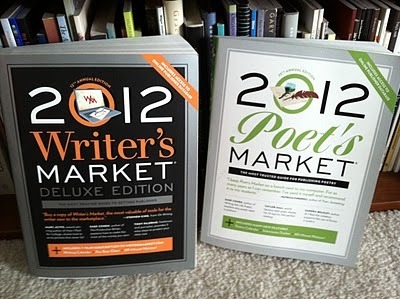
I had the honor of being featured in both this year's 2012 Writer's Market and the 2012 Poet's Market (25th annual edition!), thanks to the good graces of editor Robert Lee Brewer and Writer's Digest.
For WD I had a conversation with Robert on how I'd made the leap from poetry to memoir, the struggle to write and deal with my food allergies while on book tour ("a diet of French fries and limp house salads"), and what I value about keeping a blog. As the introduction notes, I was in Mississippi at the time. My host there was not thrilled that I was sinking hours into typing up answers to interview questions--that was time he thought I should be spending on poems--and I wondered if it was worth it. When I saw these books, I knew: absolutely. Not only in terms of the career recognition, which is thrilling, but because I get to contribute to a line of books that helped me out when I was getting started.
I have strong memories of being a high school senior and hunting through the shelves of Fairfax County's Tysons Pimmit Regional Library. The year was 1997; the edition was pumpkin-orange. Later, in college, I asked for my own copy at Christmas so I could properly dog-ear and underline (2001; it had a broad black band on the cover that made "POET" jump out). That Poet's Market was where I found the submissions listing for Rosebud , the first journal publication of mine that ever felt "official" & national. The issue in question had a bare-breasted woman wearing a bunny mask on the cover; I can still remember my mother's quizzical expression. But they'd published Stephen King! And Ray Bradbury! I was walking among gods.
Nowadays, the internet makes it easy to take for granted the availability of this kind of logistical data. But the truth is that the Writer's Market and Poet's Market databases still offer the best searchable, accurate, and specialized-by-genre information out there.
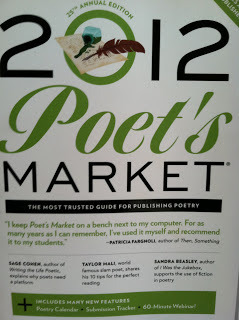 For this year's Poet's Market, I contributed a craft essay to dovetail with Collin Kelley's "Truth and Consequences in Poetry"; mine is "A Different Take on Truth & Poetry," and champions the acceptance of fiction into our voices. In the opening I define different approaches to using truth in poetry: the gardener-poets (for whom truth is the soil), the chef-poets (for whom truth is an ingredient), and folks like me..."I love to lie. And even when I'm telling the truth, I'd rather you assumed I was lying." When I saw I made the cover, my heart skipped a beat--especially being in a line-up with Sage Cohen and Taylor Mali. The second best surprise: my mother's hugely enthusiastic response to my essay. Maybe she liked that I used the metaphor of art, her realm: "Sometimes I wish poets were more like painters, who are reminded of the artificiality of their materials every time they prime a canvas or mix a palette. To paint in blood-red is not the same as to render in blood, no matter how nuanced your balance of sulfur and mercury." Maybe she liked that the essay adds to her arsenal of proofs that all my poems aren't really about our family.
For this year's Poet's Market, I contributed a craft essay to dovetail with Collin Kelley's "Truth and Consequences in Poetry"; mine is "A Different Take on Truth & Poetry," and champions the acceptance of fiction into our voices. In the opening I define different approaches to using truth in poetry: the gardener-poets (for whom truth is the soil), the chef-poets (for whom truth is an ingredient), and folks like me..."I love to lie. And even when I'm telling the truth, I'd rather you assumed I was lying." When I saw I made the cover, my heart skipped a beat--especially being in a line-up with Sage Cohen and Taylor Mali. The second best surprise: my mother's hugely enthusiastic response to my essay. Maybe she liked that I used the metaphor of art, her realm: "Sometimes I wish poets were more like painters, who are reminded of the artificiality of their materials every time they prime a canvas or mix a palette. To paint in blood-red is not the same as to render in blood, no matter how nuanced your balance of sulfur and mercury." Maybe she liked that the essay adds to her arsenal of proofs that all my poems aren't really about our family. The infusion of interviews and essays into this most recent generation of Markets has really upped their value. This year's Poet's Market includes not only the headlining pieces from Taylor Mali ("10 Tips for the Perfect Reading") and Sage Cohen ("Why Poets Need Platforms: And How to Create One"), but also Q&As with Erika Meitner and Aaron Belz, as well as a compelling guide to offering private workshops as an alternative career path and reaching more readers through Twitter, Facebook, and LinkedIn. Writer's Market gets down to the brass tacks of publishing, including how to adopt the mindset of an entrepreneur, negotiating a contract, and figuring out how much to charge. One of the things that appeals to me about turning here for guidance is that we can be honest about how much we make, how much we want to make, and how much gets siphoned away by things like postage and printer ink. There's none of the artificial inflation that can happen when a bunch of freelancers belly up to the bar for shop talk. Sometimes people request to be my friend on Facebook purely to ask "How can I get a book published?" I don't mind helping, but I just wish they'd turn to these resources first. I think they'd find everything they need.
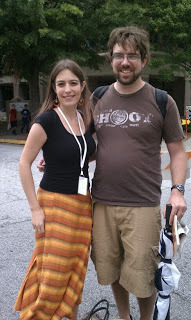
Putting out these kinds of annual guides is a draining job, and so we all owe a huge thanks to Robert (who I had the pleasure of bumping into at this year's Decatur Book Festival--here we are) and his staff of tireless editors and proofers at Writer's Digest Books. Thank you for taking some of the mystery out of the publishing process. Thank you for treating information on how, where, and to whom to submit our work not as the means to gatekeep or exclude but rather as practical matters, answers that should be made democratically available to all. Our poems find better homes, our essays get faster response times, and our stories get told. Thank you for nourishing the dreams of thousands of writers--including this particular Chick Who Digs Poetry.
Published on October 03, 2011 09:11
October 1, 2011
Weekend Food Edition
It is official: the autumn eating season is here. I told myself I was ordering the Chicken Noodle Soup at Teaism just to fend off the sniffles, but when I couldn't resist a bowl of miso broth & kale at the Modern Times Coffeehouse a few days later...I knew.
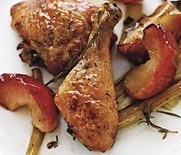 This is actually a welcome time, because my favorite all-purpose dinner recipe feels perfectly apropos. All credit goes to
Real Simple
(including the pictures). Here's the secret...
This is actually a welcome time, because my favorite all-purpose dinner recipe feels perfectly apropos. All credit goes to
Real Simple
(including the pictures). Here's the secret...
-->Preheat oven to 425 degrees.
-->Use 2-3 lbs bone-in chicken (breasts, thighs, drumsticks, wings).
-->Pair with apples & leeks OR potatoes, fennel & bell peppers (quarter the fruits and slice the vegetables as appropriate).
-->Toss with 2 tablespoons olive oil, 1 tsp salt, 1/4 tsp pepper, and sprigs of rosemary or thyme.
-->Spread in a single layer on a large rimmed baking pan.
-->Roast for about 40 minutes, or whenever the chicken is done.
Just that easy. The chicken's fat will soak into the sides, making for an unbelievable richness to the flavor. Serve with wild rice or a crusty whole grain bread.
 Browsing through the RS's October issue, this was the recipe I picked out to try next: Spaghetti Squash with Almonds. Here's the rundown...
Browsing through the RS's October issue, this was the recipe I picked out to try next: Spaghetti Squash with Almonds. Here's the rundown...
-->Preheat oven to 400 degrees.
-->Halve a 3 lb spaghetti squash and seed it. Rub the exposed squash side with a tablespoon of olive oil and turn cut-side down to a baking pan.
-->Mix together 2 tablespoons fresh lime juice, 1 tablespoon honey, 1/2 tsp cumin, 2 tablespoons olive oil, 1 tsp salt, and 1/4 tsp pepper.
-->When the squash is done roasting (40-50 minutes), tease out the "spaghetti" strands from the hull with a fork. In a bowl, toss the squash with the lime mixture. Top with 1/4 cup of sliced almonds and 4 sliced scallions.
I've always loved to cook squash. When my mother went into the hospital to give birth to my sister, my 10-year old self took on household duties with four consecutive dinners of squash and bacon--the two things I knew how to make in the microwave. (Bless my dad, who complimented every meal.) Now my tastes tend toward the butternut variety simply quartered, brushed with olive oil & maple syrup, and roasted with cherries or cranberries. I'm intrigued to try something lighter, with crunch and cumin's spice.
One thing that gives me a twinge about this see-saw between book tour and living alone in DC is that I hardly ever get to cook for my favorite folks. But it is October, and with October comes a return trip to Mississippi. The heart lifts. The stomach growls.
 This is actually a welcome time, because my favorite all-purpose dinner recipe feels perfectly apropos. All credit goes to
Real Simple
(including the pictures). Here's the secret...
This is actually a welcome time, because my favorite all-purpose dinner recipe feels perfectly apropos. All credit goes to
Real Simple
(including the pictures). Here's the secret...-->Preheat oven to 425 degrees.
-->Use 2-3 lbs bone-in chicken (breasts, thighs, drumsticks, wings).
-->Pair with apples & leeks OR potatoes, fennel & bell peppers (quarter the fruits and slice the vegetables as appropriate).
-->Toss with 2 tablespoons olive oil, 1 tsp salt, 1/4 tsp pepper, and sprigs of rosemary or thyme.
-->Spread in a single layer on a large rimmed baking pan.
-->Roast for about 40 minutes, or whenever the chicken is done.
Just that easy. The chicken's fat will soak into the sides, making for an unbelievable richness to the flavor. Serve with wild rice or a crusty whole grain bread.
 Browsing through the RS's October issue, this was the recipe I picked out to try next: Spaghetti Squash with Almonds. Here's the rundown...
Browsing through the RS's October issue, this was the recipe I picked out to try next: Spaghetti Squash with Almonds. Here's the rundown...-->Preheat oven to 400 degrees.
-->Halve a 3 lb spaghetti squash and seed it. Rub the exposed squash side with a tablespoon of olive oil and turn cut-side down to a baking pan.
-->Mix together 2 tablespoons fresh lime juice, 1 tablespoon honey, 1/2 tsp cumin, 2 tablespoons olive oil, 1 tsp salt, and 1/4 tsp pepper.
-->When the squash is done roasting (40-50 minutes), tease out the "spaghetti" strands from the hull with a fork. In a bowl, toss the squash with the lime mixture. Top with 1/4 cup of sliced almonds and 4 sliced scallions.
I've always loved to cook squash. When my mother went into the hospital to give birth to my sister, my 10-year old self took on household duties with four consecutive dinners of squash and bacon--the two things I knew how to make in the microwave. (Bless my dad, who complimented every meal.) Now my tastes tend toward the butternut variety simply quartered, brushed with olive oil & maple syrup, and roasted with cherries or cranberries. I'm intrigued to try something lighter, with crunch and cumin's spice.
One thing that gives me a twinge about this see-saw between book tour and living alone in DC is that I hardly ever get to cook for my favorite folks. But it is October, and with October comes a return trip to Mississippi. The heart lifts. The stomach growls.
Published on October 01, 2011 13:03
September 30, 2011
Playing with Old Poem Drafts
The Old Riddle
I'm a city full ofthings to do & you the new mayor: clearing gutters, cleaning graffiti, laying down asphalt.You glove my hands.You shoe my feet. In the warehouse of my chest you fit a still-beating heartthen stand back, admiring. In the chain gang,two prisoners lean on their shovels.One asks: What do you get when you fill half a hole? One answers:You get a hole.

I'm a city full ofthings to do & you the new mayor: clearing gutters, cleaning graffiti, laying down asphalt.You glove my hands.You shoe my feet. In the warehouse of my chest you fit a still-beating heartthen stand back, admiring. In the chain gang,two prisoners lean on their shovels.One asks: What do you get when you fill half a hole? One answers:You get a hole.
Published on September 30, 2011 10:05
September 24, 2011
How Charleston Won My Heart
On this overcast morning (DC's eighth straight, oof) as I wait for my sister to take her GRE's so we can run away to Baltimore, I finally have a chance to tell you about my trip to Charleston to address the Poetry Society of South Carolina.
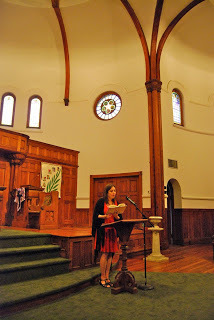 But before I can talk about going to Charleston in September, I have to tell you about going to Charleston in April. It came about through pure Facebook-style serendipity: a reader, Katrina Murphy, reached out to say how much she'd loved I Was the Jukebox. Ever in search of new routes to Mississippi, I offered to set up a Carolinas-Georgia trek and come to Charleston, if she was game to set up a reading. She did that and then some--working with W. W. Norton to get stock, arranging a newspaper feature, and booking the majestic setting of the Circular Congregational Church, built in 1681.
But before I can talk about going to Charleston in September, I have to tell you about going to Charleston in April. It came about through pure Facebook-style serendipity: a reader, Katrina Murphy, reached out to say how much she'd loved I Was the Jukebox. Ever in search of new routes to Mississippi, I offered to set up a Carolinas-Georgia trek and come to Charleston, if she was game to set up a reading. She did that and then some--working with W. W. Norton to get stock, arranging a newspaper feature, and booking the majestic setting of the Circular Congregational Church, built in 1681.
In a moment of bravado, my parents drove down to make a weekend getaway out of it. The three of us prowled the old graveyard before the reading, headstone by headstone. We stepped into the church and I gasped. It was gorgeous. As I later admitted, there were a handful of poems--"Drunk," "In the Deep"--I dropped from my set list on the spot, fearful of blasphemy.
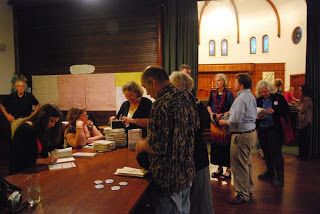 So I read "Love Poem for Wednesday," Katrina's favorite, and took some other requests. The crowd was lively (though I did manage to rattle some passers-by who sat down thinking they were on the first stop on a ghost tour).
So I read "Love Poem for Wednesday," Katrina's favorite, and took some other requests. The crowd was lively (though I did manage to rattle some passers-by who sat down thinking they were on the first stop on a ghost tour).
That's Katrina sitting beside me as I sign books. She's talking to Susan, who brought us back to her house for a dinner of roast chicken and asparagus. I can't remember another time someone home-hosted and didn't blink at all my food allergies. A small group of us stayed up late into the night, talking life and poetry over gin & tonics. Heaven. This is why poets tour: these moments of stumbling into a community you could call home.
But the next morning was all panic. I woke at 6 AM to prepare my Schedule C expense records. I was trying to make the 10-hour drive to Oxford with a stop in Birmingham to see friends expecting to meet right at 7 PM. Tornadoes were being reported in the states I'd have to drive through. I couldn't get Susan's front door to lock behind me. All the places my father wanted to show me--the courthouse, the French Quarter--no time. I left loving the people of Charleston. The town? Barely glimpsed it.
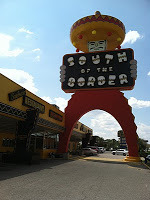 So when Richard Garcia invited me back as a guest of the Poetry Society of South Carolina, it felt like a second chance. Though once again it was a long drive, this time my father offered to do it with me.
So when Richard Garcia invited me back as a guest of the Poetry Society of South Carolina, it felt like a second chance. Though once again it was a long drive, this time my father offered to do it with me.
Part of the drive down was talking: his work in Hawai'i, my book touring, what next. Part of the drive was spent on the conversation of music: him sharing the new Tom Principato, me sharing the new Paul Simon. And part, of course, was spent on a gratuitous rest stop at South of the Border. Because that's how we roll. Also, they have the biggest real fake-looking shark I have ever seen.
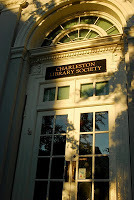 The College of Charleston gave us adjoined rooms at an incredibly reasonable rate, and we snuck in a pre-reading snack at the college deli down the street. We headed to the historic Charleston Library Society.
The College of Charleston gave us adjoined rooms at an incredibly reasonable rate, and we snuck in a pre-reading snack at the college deli down the street. We headed to the historic Charleston Library Society.
My first thought, as we walked in: Wow, another amazing space. My second thought: That's a LOT of chairs waiting to be filled. Eeek. I didn't know what to expect on a Friday night. Would it be the same faces from a few months earlier, minus those who would choose a date or a concert over hearing me again?
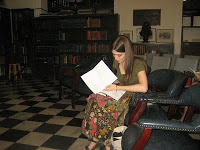 There was nothing I could do but tuck myself into a chair and make sure I knew what I was reading. I wanted to share a couple of poems from the third collection (or what I hope is a third collection; right now it's just a sheaf of loose paper). One, "Inventory," I found myself editing on the fly. Would it go over? Would this be a sestina-friendly crowd? And magically, as I sat in my chair worrying, people started to pour in. A lot of people.
There was nothing I could do but tuck myself into a chair and make sure I knew what I was reading. I wanted to share a couple of poems from the third collection (or what I hope is a third collection; right now it's just a sheaf of loose paper). One, "Inventory," I found myself editing on the fly. Would it go over? Would this be a sestina-friendly crowd? And magically, as I sat in my chair worrying, people started to pour in. A lot of people.
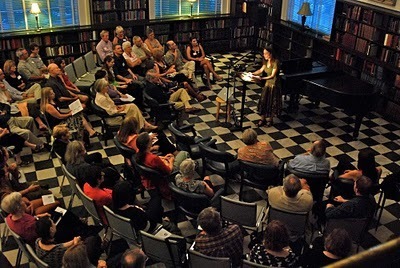
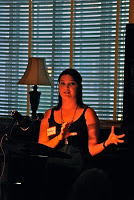 Turns out the Poetry Society of South Carolina really knows how to kick off a fall reading series. Rarely have I been so lucky in my audience: warm, responsive (they laughed at funny poems! they made that little "mmh" sound at the sad ones!) and yes, they most definitely knew how a sestina worked.
Turns out the Poetry Society of South Carolina really knows how to kick off a fall reading series. Rarely have I been so lucky in my audience: warm, responsive (they laughed at funny poems! they made that little "mmh" sound at the sad ones!) and yes, they most definitely knew how a sestina worked.
Rosalyn Cowart was local reader who opened, having returned home to Charleston after receiving her MFA at Florida State University. She had fabulous chicken poems; I'm quite sure we'll be hearing more from her.
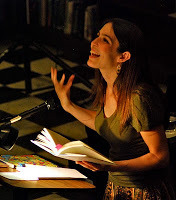 I opened with "The Emperor's Valentine," happy to take my cue from Rosalyn's animalia theme. First published in the Black Warrior Review as part of my chapbook Bitch and Brew: Sestinas, it opens:
I opened with "The Emperor's Valentine," happy to take my cue from Rosalyn's animalia theme. First published in the Black Warrior Review as part of my chapbook Bitch and Brew: Sestinas, it opens:
I admit, the monkeys were overkill.
They refused to leave their jeweled hats alone.They hurled the grapes at each other like small,hard promises of sex to come. With wildanimals there is always a small, hardpromise of sex to come. Even turtles,
shells scraping as they circle their turtle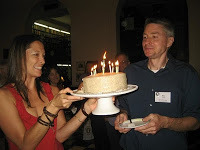 tank. For us, sharing a glass house would killthe spark. But they're exhibitionists. Hardto make blush, turtles. Never bathed alone,using the same dish to drink...
tank. For us, sharing a glass house would killthe spark. But they're exhibitionists. Hardto make blush, turtles. Never bathed alone,using the same dish to drink...
Afterwards, the best part: carousing! Jim Lundy, former PSSC president, celebrated his birthday. Jim is great--we shared a dinner conversation back in April. I'm looking forward to joining him in February 2012 for his Monday Night Words & Music.
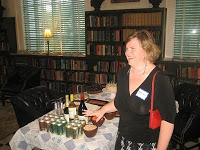 I was thrilled to see Katrina again, and she had worked with Brit (pictured holding the cake above) to set a Sandra-friendly table for the reception: almonds, grapes, vegetables and hummus, right down to crackers with no egg or milk. Though I hadn't read any "Allergy Girl" poems, one woman bought Don't Kill the Birthday Girl for her allergic grandson. We joked about the resoundingly pink cover.
I was thrilled to see Katrina again, and she had worked with Brit (pictured holding the cake above) to set a Sandra-friendly table for the reception: almonds, grapes, vegetables and hummus, right down to crackers with no egg or milk. Though I hadn't read any "Allergy Girl" poems, one woman bought Don't Kill the Birthday Girl for her allergic grandson. We joked about the resoundingly pink cover.
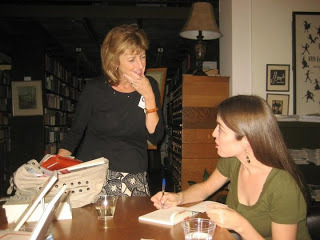 A personal highlight was meeting Marj Wentworth, Poet Laureate of South Carolina. We have Oxford, Mississippi friends in common--poets Dave Shirley and Ann Fisher-Wirth--and over dinner we talked shop. She's so versatile: her next book, co-authored with Juan E. Méndez, is Taking a Stand: The Evolution of Human Rights.
A personal highlight was meeting Marj Wentworth, Poet Laureate of South Carolina. We have Oxford, Mississippi friends in common--poets Dave Shirley and Ann Fisher-Wirth--and over dinner we talked shop. She's so versatile: her next book, co-authored with Juan E. Méndez, is Taking a Stand: The Evolution of Human Rights.
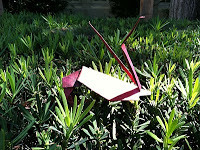 The next morning I taught a workshop on sestinas called "The Gyroscope of Form." I had a class full of ringers--Richard heavily encourages his private students to attend. It was a delight to look at examples from Philip Sidney, Elizabeth Bishop, Miller Williams, and Sonya Huber, tracking the evolution of tone, lineation, and flexility of endwords through the styles of different eras. We talked technical challenges. I shared examples of my strategic process. We drafted sestinas (or at least, the first stanza) using a pool of endwords that included "blue," "cellar," and "hermaphrodite." One participant, Kit, was inspired by the origami poems I'd read the night before to bring in her fancy papers and fold me a shrimp. On the spot. I wanted to say Can I keep all of you?
The next morning I taught a workshop on sestinas called "The Gyroscope of Form." I had a class full of ringers--Richard heavily encourages his private students to attend. It was a delight to look at examples from Philip Sidney, Elizabeth Bishop, Miller Williams, and Sonya Huber, tracking the evolution of tone, lineation, and flexility of endwords through the styles of different eras. We talked technical challenges. I shared examples of my strategic process. We drafted sestinas (or at least, the first stanza) using a pool of endwords that included "blue," "cellar," and "hermaphrodite." One participant, Kit, was inspired by the origami poems I'd read the night before to bring in her fancy papers and fold me a shrimp. On the spot. I wanted to say Can I keep all of you?
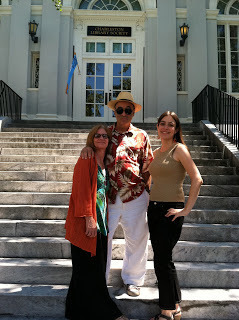
There are so many wonderful people I haven't even gotten to mention by name--Debbie, Denise, Stefan (who took all the great photos from the reading), Suzette, Jane, Bryan, and on and on. But I must give 1,000 thanks to my hosts, Richard--so sharp and funny--and Katherine Williams (yin to Richard's yang, a scientist with the heart of a poet). I hope all PSSC guests get to experience this. I didn't just feel welcomed; I felt honored. This is the oldest statewide poetry society in the country--they just celebrated a 90th anniversary--and it shows in the vitality and breadth of their programs.
Now, I'm not going to choreograph the rest of my visit, which was where my dad took over. I'll just give you a few glimpses, as we walked the cobblestones he cares so much about, learned about the quirks of the architecture, went to the water (which I had never seen in Charleston!), tasted a half-dones different kinds of olive oil, got a little goofy in an art gallery, and kept company with a very charismatic oyster shucker for an hour.
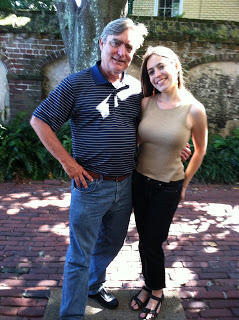
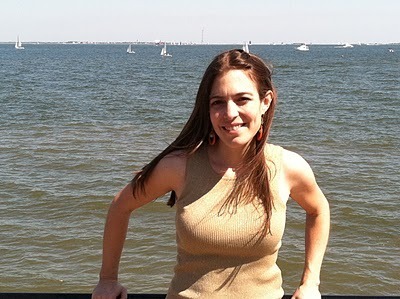
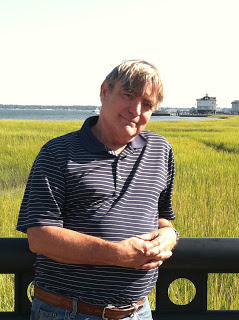
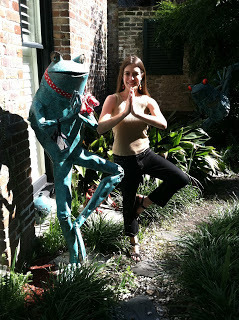
Later, a little Lowcountry blues (Katrina et al came on board for this part). A few vodka gimlets. An enthusiastic bachelorette party that roped my dad into singing "I Want to Hold Your Hand" to the bride-to-be.
I love Charleston.

 But before I can talk about going to Charleston in September, I have to tell you about going to Charleston in April. It came about through pure Facebook-style serendipity: a reader, Katrina Murphy, reached out to say how much she'd loved I Was the Jukebox. Ever in search of new routes to Mississippi, I offered to set up a Carolinas-Georgia trek and come to Charleston, if she was game to set up a reading. She did that and then some--working with W. W. Norton to get stock, arranging a newspaper feature, and booking the majestic setting of the Circular Congregational Church, built in 1681.
But before I can talk about going to Charleston in September, I have to tell you about going to Charleston in April. It came about through pure Facebook-style serendipity: a reader, Katrina Murphy, reached out to say how much she'd loved I Was the Jukebox. Ever in search of new routes to Mississippi, I offered to set up a Carolinas-Georgia trek and come to Charleston, if she was game to set up a reading. She did that and then some--working with W. W. Norton to get stock, arranging a newspaper feature, and booking the majestic setting of the Circular Congregational Church, built in 1681.In a moment of bravado, my parents drove down to make a weekend getaway out of it. The three of us prowled the old graveyard before the reading, headstone by headstone. We stepped into the church and I gasped. It was gorgeous. As I later admitted, there were a handful of poems--"Drunk," "In the Deep"--I dropped from my set list on the spot, fearful of blasphemy.
 So I read "Love Poem for Wednesday," Katrina's favorite, and took some other requests. The crowd was lively (though I did manage to rattle some passers-by who sat down thinking they were on the first stop on a ghost tour).
So I read "Love Poem for Wednesday," Katrina's favorite, and took some other requests. The crowd was lively (though I did manage to rattle some passers-by who sat down thinking they were on the first stop on a ghost tour). That's Katrina sitting beside me as I sign books. She's talking to Susan, who brought us back to her house for a dinner of roast chicken and asparagus. I can't remember another time someone home-hosted and didn't blink at all my food allergies. A small group of us stayed up late into the night, talking life and poetry over gin & tonics. Heaven. This is why poets tour: these moments of stumbling into a community you could call home.
But the next morning was all panic. I woke at 6 AM to prepare my Schedule C expense records. I was trying to make the 10-hour drive to Oxford with a stop in Birmingham to see friends expecting to meet right at 7 PM. Tornadoes were being reported in the states I'd have to drive through. I couldn't get Susan's front door to lock behind me. All the places my father wanted to show me--the courthouse, the French Quarter--no time. I left loving the people of Charleston. The town? Barely glimpsed it.
 So when Richard Garcia invited me back as a guest of the Poetry Society of South Carolina, it felt like a second chance. Though once again it was a long drive, this time my father offered to do it with me.
So when Richard Garcia invited me back as a guest of the Poetry Society of South Carolina, it felt like a second chance. Though once again it was a long drive, this time my father offered to do it with me. Part of the drive down was talking: his work in Hawai'i, my book touring, what next. Part of the drive was spent on the conversation of music: him sharing the new Tom Principato, me sharing the new Paul Simon. And part, of course, was spent on a gratuitous rest stop at South of the Border. Because that's how we roll. Also, they have the biggest real fake-looking shark I have ever seen.
 The College of Charleston gave us adjoined rooms at an incredibly reasonable rate, and we snuck in a pre-reading snack at the college deli down the street. We headed to the historic Charleston Library Society.
The College of Charleston gave us adjoined rooms at an incredibly reasonable rate, and we snuck in a pre-reading snack at the college deli down the street. We headed to the historic Charleston Library Society. My first thought, as we walked in: Wow, another amazing space. My second thought: That's a LOT of chairs waiting to be filled. Eeek. I didn't know what to expect on a Friday night. Would it be the same faces from a few months earlier, minus those who would choose a date or a concert over hearing me again?
 There was nothing I could do but tuck myself into a chair and make sure I knew what I was reading. I wanted to share a couple of poems from the third collection (or what I hope is a third collection; right now it's just a sheaf of loose paper). One, "Inventory," I found myself editing on the fly. Would it go over? Would this be a sestina-friendly crowd? And magically, as I sat in my chair worrying, people started to pour in. A lot of people.
There was nothing I could do but tuck myself into a chair and make sure I knew what I was reading. I wanted to share a couple of poems from the third collection (or what I hope is a third collection; right now it's just a sheaf of loose paper). One, "Inventory," I found myself editing on the fly. Would it go over? Would this be a sestina-friendly crowd? And magically, as I sat in my chair worrying, people started to pour in. A lot of people. 
 Turns out the Poetry Society of South Carolina really knows how to kick off a fall reading series. Rarely have I been so lucky in my audience: warm, responsive (they laughed at funny poems! they made that little "mmh" sound at the sad ones!) and yes, they most definitely knew how a sestina worked.
Turns out the Poetry Society of South Carolina really knows how to kick off a fall reading series. Rarely have I been so lucky in my audience: warm, responsive (they laughed at funny poems! they made that little "mmh" sound at the sad ones!) and yes, they most definitely knew how a sestina worked.Rosalyn Cowart was local reader who opened, having returned home to Charleston after receiving her MFA at Florida State University. She had fabulous chicken poems; I'm quite sure we'll be hearing more from her.
 I opened with "The Emperor's Valentine," happy to take my cue from Rosalyn's animalia theme. First published in the Black Warrior Review as part of my chapbook Bitch and Brew: Sestinas, it opens:
I opened with "The Emperor's Valentine," happy to take my cue from Rosalyn's animalia theme. First published in the Black Warrior Review as part of my chapbook Bitch and Brew: Sestinas, it opens:I admit, the monkeys were overkill.
They refused to leave their jeweled hats alone.They hurled the grapes at each other like small,hard promises of sex to come. With wildanimals there is always a small, hardpromise of sex to come. Even turtles,
shells scraping as they circle their turtle
 tank. For us, sharing a glass house would killthe spark. But they're exhibitionists. Hardto make blush, turtles. Never bathed alone,using the same dish to drink...
tank. For us, sharing a glass house would killthe spark. But they're exhibitionists. Hardto make blush, turtles. Never bathed alone,using the same dish to drink...Afterwards, the best part: carousing! Jim Lundy, former PSSC president, celebrated his birthday. Jim is great--we shared a dinner conversation back in April. I'm looking forward to joining him in February 2012 for his Monday Night Words & Music.
 I was thrilled to see Katrina again, and she had worked with Brit (pictured holding the cake above) to set a Sandra-friendly table for the reception: almonds, grapes, vegetables and hummus, right down to crackers with no egg or milk. Though I hadn't read any "Allergy Girl" poems, one woman bought Don't Kill the Birthday Girl for her allergic grandson. We joked about the resoundingly pink cover.
I was thrilled to see Katrina again, and she had worked with Brit (pictured holding the cake above) to set a Sandra-friendly table for the reception: almonds, grapes, vegetables and hummus, right down to crackers with no egg or milk. Though I hadn't read any "Allergy Girl" poems, one woman bought Don't Kill the Birthday Girl for her allergic grandson. We joked about the resoundingly pink cover.  A personal highlight was meeting Marj Wentworth, Poet Laureate of South Carolina. We have Oxford, Mississippi friends in common--poets Dave Shirley and Ann Fisher-Wirth--and over dinner we talked shop. She's so versatile: her next book, co-authored with Juan E. Méndez, is Taking a Stand: The Evolution of Human Rights.
A personal highlight was meeting Marj Wentworth, Poet Laureate of South Carolina. We have Oxford, Mississippi friends in common--poets Dave Shirley and Ann Fisher-Wirth--and over dinner we talked shop. She's so versatile: her next book, co-authored with Juan E. Méndez, is Taking a Stand: The Evolution of Human Rights. The next morning I taught a workshop on sestinas called "The Gyroscope of Form." I had a class full of ringers--Richard heavily encourages his private students to attend. It was a delight to look at examples from Philip Sidney, Elizabeth Bishop, Miller Williams, and Sonya Huber, tracking the evolution of tone, lineation, and flexility of endwords through the styles of different eras. We talked technical challenges. I shared examples of my strategic process. We drafted sestinas (or at least, the first stanza) using a pool of endwords that included "blue," "cellar," and "hermaphrodite." One participant, Kit, was inspired by the origami poems I'd read the night before to bring in her fancy papers and fold me a shrimp. On the spot. I wanted to say Can I keep all of you?
The next morning I taught a workshop on sestinas called "The Gyroscope of Form." I had a class full of ringers--Richard heavily encourages his private students to attend. It was a delight to look at examples from Philip Sidney, Elizabeth Bishop, Miller Williams, and Sonya Huber, tracking the evolution of tone, lineation, and flexility of endwords through the styles of different eras. We talked technical challenges. I shared examples of my strategic process. We drafted sestinas (or at least, the first stanza) using a pool of endwords that included "blue," "cellar," and "hermaphrodite." One participant, Kit, was inspired by the origami poems I'd read the night before to bring in her fancy papers and fold me a shrimp. On the spot. I wanted to say Can I keep all of you?
There are so many wonderful people I haven't even gotten to mention by name--Debbie, Denise, Stefan (who took all the great photos from the reading), Suzette, Jane, Bryan, and on and on. But I must give 1,000 thanks to my hosts, Richard--so sharp and funny--and Katherine Williams (yin to Richard's yang, a scientist with the heart of a poet). I hope all PSSC guests get to experience this. I didn't just feel welcomed; I felt honored. This is the oldest statewide poetry society in the country--they just celebrated a 90th anniversary--and it shows in the vitality and breadth of their programs.
Now, I'm not going to choreograph the rest of my visit, which was where my dad took over. I'll just give you a few glimpses, as we walked the cobblestones he cares so much about, learned about the quirks of the architecture, went to the water (which I had never seen in Charleston!), tasted a half-dones different kinds of olive oil, got a little goofy in an art gallery, and kept company with a very charismatic oyster shucker for an hour.




Later, a little Lowcountry blues (Katrina et al came on board for this part). A few vodka gimlets. An enthusiastic bachelorette party that roped my dad into singing "I Want to Hold Your Hand" to the bride-to-be.
I love Charleston.
Published on September 24, 2011 10:58
September 22, 2011
New Poem Draft
...it won't be up for long, per usual. But here's what I was working on tonight.
Delta
300 miles north of where the snaking Mississippi tries to swallow the Gulf of Mexico, there is
another Delta: alluvial plain flat as a slap,year upon year of flood yielding this pyrrhic fertility.
Strange how the crop can flavor a man's every breath—cotton hope, catfish stink, and now this stubborn brightness of corn.
Fuckin' corn, you tell me, blood in your voice. But at least it doesn't swallow the oxygen.
You, who called me late and liquor-drunk to say I am in the loneliest hotel room in Tunica.Hanging up, and when I called you back,hanging up.Again, again, until we spoke only in the Morse Code of disconnections.
You, who refuses to eat fish unless in sight of the ocean.
A local difference in elevation is called a relief. The Delta offers no relief. The Delta is what made you strong enough to leave it.
You, my love, were meant to have a son.Who else can grant the clemency
of being only partially remembered?
Who else could level us, washing away all
but the worthwhile sediment?
A mathematician will tell you that there's change here.A chemist will say, Just add heat.
Delta
300 miles north of where the snaking Mississippi tries to swallow the Gulf of Mexico, there is
another Delta: alluvial plain flat as a slap,year upon year of flood yielding this pyrrhic fertility.
Strange how the crop can flavor a man's every breath—cotton hope, catfish stink, and now this stubborn brightness of corn.
Fuckin' corn, you tell me, blood in your voice. But at least it doesn't swallow the oxygen.
You, who called me late and liquor-drunk to say I am in the loneliest hotel room in Tunica.Hanging up, and when I called you back,hanging up.Again, again, until we spoke only in the Morse Code of disconnections.
You, who refuses to eat fish unless in sight of the ocean.
A local difference in elevation is called a relief. The Delta offers no relief. The Delta is what made you strong enough to leave it.
You, my love, were meant to have a son.Who else can grant the clemency
of being only partially remembered?
Who else could level us, washing away all
but the worthwhile sediment?
A mathematician will tell you that there's change here.A chemist will say, Just add heat.
Published on September 22, 2011 20:47
September 16, 2011
Friday Reads & Friday Edits
I've been gathering snapshots for a full report on last weekend's Charleston trip, but that will wait until Monday. My Thursday and Friday have been spent in a gloriously unkempt state: hair greasy, emails ignored, and a diet of gin and lentils. My mid-back aches. My bed has been hit with a blizzard of paper.
I have been poeming. Revising, shuffling pages, starting to think about the conversations poems can have with each other, the fine line between repeating motifs and poaching from oneself. (A book is big enough for two pirate poems, right? Right?) Spending a half-hour moving stanzas into the third person, then moving them back again. Pulling familiar poetry collections off the shelf to read in that ravenous way that usually happens at art colonies--in part for entertainment, in part for inspiration, in part to recharge my sense of lineage. Last night, it was What Is This Thing Called Love; now, Tell Me.
"FridayReads" is a collaborative event on Twitter marked by the hashtag #FridayReads and coordinated by Bethanne Patrick (a Virginia writer who uses the handle @TheBookMaven). The concept is simple, affirming, and addictive: every Friday, report what you're reading. The first time I ever ventured onto Twitter with my spankin' new handle, I found Don't Kill the Birthday Girl listed--a Random House bookseller had a galley in hand--and that just blew my mind. My memoir! Spotted in the wild!
This post is a love note to the thrill of seeing a finished book navigate the world...and then the deeper thrill of turning to the next book. My #FridayRead? Kim Addonizio. And Sandra Beasley.


I have been poeming. Revising, shuffling pages, starting to think about the conversations poems can have with each other, the fine line between repeating motifs and poaching from oneself. (A book is big enough for two pirate poems, right? Right?) Spending a half-hour moving stanzas into the third person, then moving them back again. Pulling familiar poetry collections off the shelf to read in that ravenous way that usually happens at art colonies--in part for entertainment, in part for inspiration, in part to recharge my sense of lineage. Last night, it was What Is This Thing Called Love; now, Tell Me.
"FridayReads" is a collaborative event on Twitter marked by the hashtag #FridayReads and coordinated by Bethanne Patrick (a Virginia writer who uses the handle @TheBookMaven). The concept is simple, affirming, and addictive: every Friday, report what you're reading. The first time I ever ventured onto Twitter with my spankin' new handle, I found Don't Kill the Birthday Girl listed--a Random House bookseller had a galley in hand--and that just blew my mind. My memoir! Spotted in the wild!
This post is a love note to the thrill of seeing a finished book navigate the world...and then the deeper thrill of turning to the next book. My #FridayRead? Kim Addonizio. And Sandra Beasley.

Published on September 16, 2011 14:38
September 8, 2011
What I Think About When I Think About BlazeVOX
Looking back on my last few blog posts, I see a running theme of aggregation. I was very tempted to write a post with the title of "BlazeVOX, DBF, and PSSC." That is the nature of my life right now: one thing piled on top of the other. I came into September and October knowing they would be about worktravelworktravelwork, and that is the case. The purity is satisfying. But I kinda miss having the time to go see a movie.
So. Back to the subject at hand. There was a recent wave of controversy over the publication practices of BlazeVox, an independent publisher that has put out books by many poets I respect, including Aaron Belz, Christine Hamm, and Steven D. Schroeder. For a primer, here are the posts that got people talking:
Brett Ortler, "The Half-Hearted Acceptance Letter"
HTMLGiant, "Has BlazeVOX Gone Vanity Press?"
Here are two posts that offered thoughtful concerns:
Mike Meginnis, managing editor of Puerto del Sol
Roxane Gay, HTMLGiant contributor & co-editor of PANK
Here are two posts that offered thoughtful defenses:
Reb Livingston, editor of No Tell Books
Shanna Compton, editor of Bloof Books
(In addition, I really liked Bruce Covey's notes on the comparative economic model of Coconut Books, but I'm not sure I can link to them if you're not his friend on Facebook.)
My instinct is to champion BlazeVOX, and not just because I like what they (or at least their authors) do. No one celebrates the implosion of a press and the consequences for its authors. People kept making references to the Tupelo Press controversy of a few years back, but what it really made me think about was when Zoo Press shuttered a year before. So I was very glad to hear that Geoffrey Gatza had reversed his initial decision to close BlazeVOX's doors at the end of the year, with this open letter explaining their practices (and a commitment, one hopes, to communicate better in the future).
What do I have to add to the conversation? Well, a lot of the hubbub has assumed that DIY/indie presses operate within some sort of bubble--for better or worse--and that the editors and authors moving within have motivations and financial considerations apart from the rest of the book world. Hmmm. I've experienced all levels of publishing. I've collected friends' handmade editions in runs of 50. I've served on the Board and as editor at a nonprofit collaborative press. I've published poetry with a university press. I've published poetry with a New York house. I've published nonfiction with a New York house. All within the space of six years or so, which means you can't tell me that the publishing era isn't somewhat contiguous, even with recent technologies.
Fostering the isolation of poetry from the rest of publishing is terribly misleading.
Here is what I'd like to affirm, interject, and propose:
-Affirmation: All poetry book presses receive financial collaboration from their writers. Or if not, they should.
To object to providing $250 support because it is in hard money is to get distracted from the overall point. $250 = cost of travel for two events (traveling cheap) + postage for 5 potential reviews + postage for 5 reading opportunities + a box of promotional cards. If you're not prepared to pitch in this amount three times over in the first year of publication, then ask yourself what your goals are with publishing a book with a press.
Are you looking for the validation of seeing your words in print? Then self-publish. Are you looking for the validation of being associated with a certain editorial imprint? Then respect the thousands of dollars of man-hours, comparatively, someone has sunk into building that reputation. Are you looking to sell some books and maybe even make money back? Again: be prepared to invest three times over, and then some.
This start-up financial burden, however imposed, is not something the author is forced to take on alone. Ask your community to support you. For years, Finishing Line Press has had people whose chapbooks they accept for publication pre-sell copies, explaining that their final print run would depend on pre-sales. Or go on Kickstarter; one poet supported her trip to Bread Loaf this year with a Kickstarter campaign, which will help sell her book of poetry by association (and I contributed, happily).
I have been fortunate enough to have successful books, and to be a full-time writer for this blink of a year or two. But there are no free rides. I've invested hundreds of dollars in buying my own stock so that I could handsell when on the road. Even when I got a generous advance, it was only because I agreed to a project timeline that meant I would have to quit my job. I am happier than I was five years ago. But I am poorer, too.
-Interjection: "Poets spend more money on their desire to be published than they do on poetry itself"...unless you count the poetry they buy in pursuit of being published.
The first part quotes Reb Livingston, who made a cutting & true point about the many people who will come to hear her speak (or hear her poets read), opt not to buy a single book, but then have the audacity to ask about their submissions policy. The second part of the italicized phrase is mine, an interjection. It's not pretty, but here it is~
How many of us are guilty of buying a book for the sake of interacting with the
author? Editor? Publisher? Then never getting around to actually looking at the book?
When I see a camp championing a press because of its authors....and then a subset of those authors complaining/admitting shoddy production values...I think Uh oh.
In some ways, I think buying-without-reading is just as damning a trend as not buying books at all. That's why something like VOUCHED's Guerilla Book Stores, which I witnessed in action firsthand at the Decatur Book Festival, is awesome. And yet so...disturbingly rare. This goes back to what Roxane Gay observed about the "Kingdom of Kings," a.k.a. the over-saturation of the market. Maybe we'd all be better off if we stopped buying books to network, and only bought books to read.
I apologize to publishers in advance if my sales take a nosedive after this.
-Proposal: We need better, more innovative models of promoting poetry to new audiences. (Here I am echoing Jeannine Hall Gailey).
If the epicenter of your annual sales model is the AWP conference, you gotta shake it up. That's right, even if you plan to have really cool swag (shot glasses!) at your table, and an offsite reading at the grubbiest hipster bar in town. We have got to stop thinking that credibility in our own community is enough.
Even if your nod to the outside world is just to leave one copy in a print run of 50 on a bench in your local public library...do it. One reason I loved Ugly Duckling Presse in early years, and now projects such as isreads, is that they "trick" people into receiving poetry who might otherwise have never seen it. I love oddball distribution tactics. Tucking poems into a free newspaper, or taping them up outside an aviary? Hell yeah. That is the spirit, even if the monetization doesn't immediately follow.
Think about posting to social media venues (Facebook, Twitter, blogs) based on content and themes, rather than author identity. As a woman who stumbled into a whole cult of capybara fandom after "Unit of Measure" was published, trust me: people will come to poetry if they realize the poetry addresses something they care about.
Think high schools, maybe with some talking points to make kids comfortable. Even if the work is experimental. Especially if the work is experimental. Remember how much e.e. cummings blew your mind in the 10th grade, even if you didn't totally get it?
Think of going into elderly communities. Sure, they might not prize your shot glasses. But they are educated, they knew their Modernism back in the day, and they buy books.
If this sounds like a bunch of advice-from-on-high, keep in mind: if I had relied on the audience for literary memoir to be the primary support of Don't Kill the Birthday Girl, I'd feel like a failure right now. Right. Now. Two months after the book came out. I'm speaking from deep in the trenches of working my ass off to support my writing.
In the case of this book, my best readers may be people who don't regularly make it out to bookstores or universities. My publisher and I have to hustle to reach them--through social media posts, through speeches in unconventional venues, though School Library Journal, through editors in mainstream media who just happen to have lives affected by food allergy. But once we do find those readers, they are smart, enthusiastic, and highly engaged. They are worth the work. I don't think this is that dissimilar to finding people who could love poetry...in the world beyond self-appointed poetry lovers.
#
So, yeah. I hope that's helpful. I spent about five hours on this--which, if only I were a paid "poetry consultant" for a big corporate firm, would have easily netted me $250 in billable hours. Sigh.
#
I'll have to wait and gather my thoughts & snapshots from DBF and PSSC in one place, on the flipside of this weekend's travels. Long story short: I love Decatur. Also, I'd love for you to join me this weekend in Charleston, South Carolina. Here are the details of my Friday night reading & my Saturday morning seminar on sestinas....
Join Sandra Beasley for an evening of poetry, including a readingfrom I Was the Jukebox and new workFriday, September 9 ~ 7 PMThe Charleston Library Society164 King Street (just before Queen) Free & open to the public
Seminar with Sandra Beasley on "The Gyroscope of Form:Sestinas Past, Present, and Future"Saturday, September 10 ~ 10 AMThe Charleston Library Society164 King Street (just before Queen) Members $10, College of Charleston students free, all others $15
Oh! For that matter, if you live in Virginia please consider dropping in at Chop Suey Books on Sunday afternoon in Richmond, VA:
Join Sandra Beasley for a reading from her memoir, Don't Kill the Birthday Girl: Tale from an Allergic Life Sunday, September 11 ~ 4 PMChop Suey Books2913 West Cary StreetFree & open to the public
I will be roadtripping with my dad. I am pretty excited about that, since 1) I won't have to drive, and 2) my dad is awesome. Kevin Wilson, author of the The Family Fang, also roadtrips with his dad for book tour. So there.
So. Back to the subject at hand. There was a recent wave of controversy over the publication practices of BlazeVox, an independent publisher that has put out books by many poets I respect, including Aaron Belz, Christine Hamm, and Steven D. Schroeder. For a primer, here are the posts that got people talking:
Brett Ortler, "The Half-Hearted Acceptance Letter"
HTMLGiant, "Has BlazeVOX Gone Vanity Press?"
Here are two posts that offered thoughtful concerns:
Mike Meginnis, managing editor of Puerto del Sol
Roxane Gay, HTMLGiant contributor & co-editor of PANK
Here are two posts that offered thoughtful defenses:
Reb Livingston, editor of No Tell Books
Shanna Compton, editor of Bloof Books
(In addition, I really liked Bruce Covey's notes on the comparative economic model of Coconut Books, but I'm not sure I can link to them if you're not his friend on Facebook.)
My instinct is to champion BlazeVOX, and not just because I like what they (or at least their authors) do. No one celebrates the implosion of a press and the consequences for its authors. People kept making references to the Tupelo Press controversy of a few years back, but what it really made me think about was when Zoo Press shuttered a year before. So I was very glad to hear that Geoffrey Gatza had reversed his initial decision to close BlazeVOX's doors at the end of the year, with this open letter explaining their practices (and a commitment, one hopes, to communicate better in the future).
What do I have to add to the conversation? Well, a lot of the hubbub has assumed that DIY/indie presses operate within some sort of bubble--for better or worse--and that the editors and authors moving within have motivations and financial considerations apart from the rest of the book world. Hmmm. I've experienced all levels of publishing. I've collected friends' handmade editions in runs of 50. I've served on the Board and as editor at a nonprofit collaborative press. I've published poetry with a university press. I've published poetry with a New York house. I've published nonfiction with a New York house. All within the space of six years or so, which means you can't tell me that the publishing era isn't somewhat contiguous, even with recent technologies.
Fostering the isolation of poetry from the rest of publishing is terribly misleading.
Here is what I'd like to affirm, interject, and propose:
-Affirmation: All poetry book presses receive financial collaboration from their writers. Or if not, they should.
To object to providing $250 support because it is in hard money is to get distracted from the overall point. $250 = cost of travel for two events (traveling cheap) + postage for 5 potential reviews + postage for 5 reading opportunities + a box of promotional cards. If you're not prepared to pitch in this amount three times over in the first year of publication, then ask yourself what your goals are with publishing a book with a press.
Are you looking for the validation of seeing your words in print? Then self-publish. Are you looking for the validation of being associated with a certain editorial imprint? Then respect the thousands of dollars of man-hours, comparatively, someone has sunk into building that reputation. Are you looking to sell some books and maybe even make money back? Again: be prepared to invest three times over, and then some.
This start-up financial burden, however imposed, is not something the author is forced to take on alone. Ask your community to support you. For years, Finishing Line Press has had people whose chapbooks they accept for publication pre-sell copies, explaining that their final print run would depend on pre-sales. Or go on Kickstarter; one poet supported her trip to Bread Loaf this year with a Kickstarter campaign, which will help sell her book of poetry by association (and I contributed, happily).
I have been fortunate enough to have successful books, and to be a full-time writer for this blink of a year or two. But there are no free rides. I've invested hundreds of dollars in buying my own stock so that I could handsell when on the road. Even when I got a generous advance, it was only because I agreed to a project timeline that meant I would have to quit my job. I am happier than I was five years ago. But I am poorer, too.
-Interjection: "Poets spend more money on their desire to be published than they do on poetry itself"...unless you count the poetry they buy in pursuit of being published.
The first part quotes Reb Livingston, who made a cutting & true point about the many people who will come to hear her speak (or hear her poets read), opt not to buy a single book, but then have the audacity to ask about their submissions policy. The second part of the italicized phrase is mine, an interjection. It's not pretty, but here it is~
How many of us are guilty of buying a book for the sake of interacting with the
author? Editor? Publisher? Then never getting around to actually looking at the book?
When I see a camp championing a press because of its authors....and then a subset of those authors complaining/admitting shoddy production values...I think Uh oh.
In some ways, I think buying-without-reading is just as damning a trend as not buying books at all. That's why something like VOUCHED's Guerilla Book Stores, which I witnessed in action firsthand at the Decatur Book Festival, is awesome. And yet so...disturbingly rare. This goes back to what Roxane Gay observed about the "Kingdom of Kings," a.k.a. the over-saturation of the market. Maybe we'd all be better off if we stopped buying books to network, and only bought books to read.
I apologize to publishers in advance if my sales take a nosedive after this.
-Proposal: We need better, more innovative models of promoting poetry to new audiences. (Here I am echoing Jeannine Hall Gailey).
If the epicenter of your annual sales model is the AWP conference, you gotta shake it up. That's right, even if you plan to have really cool swag (shot glasses!) at your table, and an offsite reading at the grubbiest hipster bar in town. We have got to stop thinking that credibility in our own community is enough.
Even if your nod to the outside world is just to leave one copy in a print run of 50 on a bench in your local public library...do it. One reason I loved Ugly Duckling Presse in early years, and now projects such as isreads, is that they "trick" people into receiving poetry who might otherwise have never seen it. I love oddball distribution tactics. Tucking poems into a free newspaper, or taping them up outside an aviary? Hell yeah. That is the spirit, even if the monetization doesn't immediately follow.
Think about posting to social media venues (Facebook, Twitter, blogs) based on content and themes, rather than author identity. As a woman who stumbled into a whole cult of capybara fandom after "Unit of Measure" was published, trust me: people will come to poetry if they realize the poetry addresses something they care about.
Think high schools, maybe with some talking points to make kids comfortable. Even if the work is experimental. Especially if the work is experimental. Remember how much e.e. cummings blew your mind in the 10th grade, even if you didn't totally get it?
Think of going into elderly communities. Sure, they might not prize your shot glasses. But they are educated, they knew their Modernism back in the day, and they buy books.
If this sounds like a bunch of advice-from-on-high, keep in mind: if I had relied on the audience for literary memoir to be the primary support of Don't Kill the Birthday Girl, I'd feel like a failure right now. Right. Now. Two months after the book came out. I'm speaking from deep in the trenches of working my ass off to support my writing.
In the case of this book, my best readers may be people who don't regularly make it out to bookstores or universities. My publisher and I have to hustle to reach them--through social media posts, through speeches in unconventional venues, though School Library Journal, through editors in mainstream media who just happen to have lives affected by food allergy. But once we do find those readers, they are smart, enthusiastic, and highly engaged. They are worth the work. I don't think this is that dissimilar to finding people who could love poetry...in the world beyond self-appointed poetry lovers.
#
So, yeah. I hope that's helpful. I spent about five hours on this--which, if only I were a paid "poetry consultant" for a big corporate firm, would have easily netted me $250 in billable hours. Sigh.
#
I'll have to wait and gather my thoughts & snapshots from DBF and PSSC in one place, on the flipside of this weekend's travels. Long story short: I love Decatur. Also, I'd love for you to join me this weekend in Charleston, South Carolina. Here are the details of my Friday night reading & my Saturday morning seminar on sestinas....
Join Sandra Beasley for an evening of poetry, including a readingfrom I Was the Jukebox and new workFriday, September 9 ~ 7 PMThe Charleston Library Society164 King Street (just before Queen) Free & open to the public
Seminar with Sandra Beasley on "The Gyroscope of Form:Sestinas Past, Present, and Future"Saturday, September 10 ~ 10 AMThe Charleston Library Society164 King Street (just before Queen) Members $10, College of Charleston students free, all others $15
Oh! For that matter, if you live in Virginia please consider dropping in at Chop Suey Books on Sunday afternoon in Richmond, VA:
Join Sandra Beasley for a reading from her memoir, Don't Kill the Birthday Girl: Tale from an Allergic Life Sunday, September 11 ~ 4 PMChop Suey Books2913 West Cary StreetFree & open to the public
I will be roadtripping with my dad. I am pretty excited about that, since 1) I won't have to drive, and 2) my dad is awesome. Kevin Wilson, author of the The Family Fang, also roadtrips with his dad for book tour. So there.
Published on September 08, 2011 01:06
September 2, 2011
Looking Forward, Looking Back
I'm excited to roadtrip with my mom out to Leesburg tonight and speak about "Projecting Your Voice on the Page." You know you've hit the big leagues when you make the
Loudon Times Mirror
.
But I am also really looking forward to this weekend's visit to the Decatur Book Festival. Twice I have mentioned this to someone only to be immediately told "OH. I have an amazing story about Decatur Illinois." Which is great, but I'm going to the Decatur in Georgia--where I assure you, the restaurants will be hopping and the writers dancing. At least, I will be.
These are the details of my event:
SUNDAY, SEPTEMBER 4 ~ 3:45 PM ~ Sandra Beasley Reading from Don't Kill The Birthday Girl: Tales From An Allergic LifeDecatur Conference Center Stage (Ballroom B)
I'm hoping to land in Atlanta on Saturday morning in time to have a quick lunch with Katia Hetter (a freelancer who interviewed me for this great piece she wrote for CNN.com), her daughter, and Michelle Kelly (owner of Pure Knead, one of the most allergy-friendly bakeries in the country). Then I might try to to catch the end of "The 21st Century South" panel with Jake Adam York, or else hear Karen Russell read from Swamplandia! Then I'll dash to hear the incredibly dynamic (and fellow New Issues poet) Jericho Brown read poems. And then...who knows? I will go where the day takes me. Plus, maybe have to check into my hotel at some point.
I hear they have an honest-to-goodness Author Hospitality Suite with free beer, wine, and WiFi. Somebody pinch me.
Anyway, that is all looking forward. But I also had cause to look back this week, when Ned Balbo--Baltimore resident, acclaimed poet, and husband of poet Jane Satterfield--sent me a snapshot from a recent visit to Virginia Center for Creative Arts. The photograph shows part of the bulletin board in one of the community artist kitchens out in the studio building...

Wow. That was from my first stay at VCCA, as a Cafritz Fellow for poetry. I was working on a series of formal poems about individual circus and carnival acts, inspired by a book of photographs from the turn of the century. This was not one of those poems; this would later find its way into my first collection, Theories of Falling. C. M. Mayo was my bathroom-mate. The youngest artist at the colony was an artist who had gone to my high school (a little weird, when you consider it was a high school for science and technology). We had a huge ice storm. We roasted marshmallows. The best person at building fires in the fireplace was Marianne Swierenga, who would a few years later turn out to be the managing editor at New Issues. I read with Alfred Corn. I took before-dawn walks with the "T.D." of the epigraph. I ate a lot of oatmeal and drank a lot of coffee. We found an abandoned school bus in an overgrown field. Leslie took a portrait of me blowing bubbles in the courtyard. I wrote and wrote. We played Scrabble. We knew our lives were changing by the day.
When I posted that draft on my last night at the colony, I assumed the bulletin board's contents were regularly turned over. I was used to the bulletin boards of college campuses--a blizzard of flyers in which something is always being covered or torn down. Yet there my little poem remains a half-dozen years later.
But I am also really looking forward to this weekend's visit to the Decatur Book Festival. Twice I have mentioned this to someone only to be immediately told "OH. I have an amazing story about Decatur Illinois." Which is great, but I'm going to the Decatur in Georgia--where I assure you, the restaurants will be hopping and the writers dancing. At least, I will be.
These are the details of my event:
SUNDAY, SEPTEMBER 4 ~ 3:45 PM ~ Sandra Beasley Reading from Don't Kill The Birthday Girl: Tales From An Allergic LifeDecatur Conference Center Stage (Ballroom B)
I'm hoping to land in Atlanta on Saturday morning in time to have a quick lunch with Katia Hetter (a freelancer who interviewed me for this great piece she wrote for CNN.com), her daughter, and Michelle Kelly (owner of Pure Knead, one of the most allergy-friendly bakeries in the country). Then I might try to to catch the end of "The 21st Century South" panel with Jake Adam York, or else hear Karen Russell read from Swamplandia! Then I'll dash to hear the incredibly dynamic (and fellow New Issues poet) Jericho Brown read poems. And then...who knows? I will go where the day takes me. Plus, maybe have to check into my hotel at some point.
I hear they have an honest-to-goodness Author Hospitality Suite with free beer, wine, and WiFi. Somebody pinch me.
Anyway, that is all looking forward. But I also had cause to look back this week, when Ned Balbo--Baltimore resident, acclaimed poet, and husband of poet Jane Satterfield--sent me a snapshot from a recent visit to Virginia Center for Creative Arts. The photograph shows part of the bulletin board in one of the community artist kitchens out in the studio building...

Wow. That was from my first stay at VCCA, as a Cafritz Fellow for poetry. I was working on a series of formal poems about individual circus and carnival acts, inspired by a book of photographs from the turn of the century. This was not one of those poems; this would later find its way into my first collection, Theories of Falling. C. M. Mayo was my bathroom-mate. The youngest artist at the colony was an artist who had gone to my high school (a little weird, when you consider it was a high school for science and technology). We had a huge ice storm. We roasted marshmallows. The best person at building fires in the fireplace was Marianne Swierenga, who would a few years later turn out to be the managing editor at New Issues. I read with Alfred Corn. I took before-dawn walks with the "T.D." of the epigraph. I ate a lot of oatmeal and drank a lot of coffee. We found an abandoned school bus in an overgrown field. Leslie took a portrait of me blowing bubbles in the courtyard. I wrote and wrote. We played Scrabble. We knew our lives were changing by the day.
When I posted that draft on my last night at the colony, I assumed the bulletin board's contents were regularly turned over. I was used to the bulletin boards of college campuses--a blizzard of flyers in which something is always being covered or torn down. Yet there my little poem remains a half-dozen years later.
Published on September 02, 2011 06:22
August 29, 2011
"Projecting Your Voice on the Page" in VA
Many of my events coming up this fall will follow a traditional rhythm--I read from a book, I take some questions, etc. But a few of the events have a wildcard format, something for me to get excited (and slightly nervous) about. I need to put together a Powerpoint presentation on the history of allergy for an audience of doctors. I'll lead a seminar on the sestina for the Poetry Society of South Carolina that's in Charleston on Saturday, September 10. And then there's this Friday....
This Friday (September 2), I'm avoiding Labor Day traffic and getting on Route 7 to drive to Leesburg, Virginia.
Now, an aside. Route 7 holds a special place in my heart. Many associate it with the Gordian-knot nightmare of Tyson's Corner. But for me it is the winding stretch that goes from my grandmother's house in Seven Corners, out to my family's house adjacent to the Wolf Trap National Park and Filene Center, and then all the way out into the rural areas around Harper's Ferry. It was the first road I ever drove, and it took me everywhere a high schooler could need to go (except, er, my actual high school--had to use the Beltway for that).
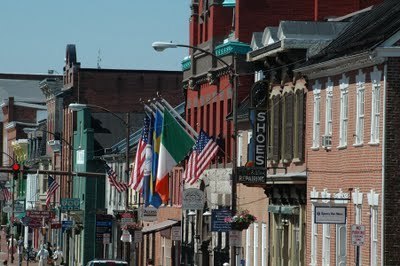 Anyway, I'll hop into the car with my mom and drive out Route 7 to Leesburg to be part of the "First Friday" entertainments in their historic and walkable downtown. This is a really cool mix of live acoustic music, wine tasting, art gallery openings, letter press demonstrations, even a comedy hour called "Last Ham Standing." So even if you're not a writer, there will be lots to do. But if you ARE a writer, you might consider joining us for this...
Anyway, I'll hop into the car with my mom and drive out Route 7 to Leesburg to be part of the "First Friday" entertainments in their historic and walkable downtown. This is a really cool mix of live acoustic music, wine tasting, art gallery openings, letter press demonstrations, even a comedy hour called "Last Ham Standing." So even if you're not a writer, there will be lots to do. But if you ARE a writer, you might consider joining us for this...
"Projecting Your Voice on the Page" with Sandra Beasley
Northern Virginia Writers First Friday ~ September 2, 2011 ~ 7:30 PMin the Leesburg Town Hall, 25 W. Market St., Leesburg, VA 20176
Voice: It is perhaps the most elusive element of strong writing. In this presentation, award-winning author and poet Sandra Beasley will discuss how to develop a voice that is immediate, compelling and precise.
Beasley is author of I Was the Jukebox, winner of the 2009 Barnard Women Poets Prize. Her debut, Theories of Falling, was selected by Marie Howe as the winner of the 2007 New Issues Poetry Prize. In July of this year, Crown published her memoir, Don't Kill the Birthday Girl: Tales from an Allergic Life, which offers a cultural history of food allergies in America and was declared a great summer read by Health magazine. Sandra also is an essayist whose work has been featured in The Washington Post Magazine. She serves on the board of the Writer's Center.
Cost: $4 for members of The Writer's Center and residents of Leesburg; $6 for the general public. For more information, visit www.writer.org or call #301-654-8664.
#
I'm going to offer a mix of practical tips and observations that will apply to working in both prose and poetry. We'll look at some great examples of clear and forceful voices of authors past. If you've ever found yourself frustrated by a slow opening to your essay--all background, no hook--or a poem idea that feels so alive in your head but falls flat on the page, this seminar is for you. And we'll have fun. It's a Friday night on a holiday weekend! We're going to make this Friday-night worthy.

This Friday (September 2), I'm avoiding Labor Day traffic and getting on Route 7 to drive to Leesburg, Virginia.
Now, an aside. Route 7 holds a special place in my heart. Many associate it with the Gordian-knot nightmare of Tyson's Corner. But for me it is the winding stretch that goes from my grandmother's house in Seven Corners, out to my family's house adjacent to the Wolf Trap National Park and Filene Center, and then all the way out into the rural areas around Harper's Ferry. It was the first road I ever drove, and it took me everywhere a high schooler could need to go (except, er, my actual high school--had to use the Beltway for that).
 Anyway, I'll hop into the car with my mom and drive out Route 7 to Leesburg to be part of the "First Friday" entertainments in their historic and walkable downtown. This is a really cool mix of live acoustic music, wine tasting, art gallery openings, letter press demonstrations, even a comedy hour called "Last Ham Standing." So even if you're not a writer, there will be lots to do. But if you ARE a writer, you might consider joining us for this...
Anyway, I'll hop into the car with my mom and drive out Route 7 to Leesburg to be part of the "First Friday" entertainments in their historic and walkable downtown. This is a really cool mix of live acoustic music, wine tasting, art gallery openings, letter press demonstrations, even a comedy hour called "Last Ham Standing." So even if you're not a writer, there will be lots to do. But if you ARE a writer, you might consider joining us for this... "Projecting Your Voice on the Page" with Sandra Beasley
Northern Virginia Writers First Friday ~ September 2, 2011 ~ 7:30 PMin the Leesburg Town Hall, 25 W. Market St., Leesburg, VA 20176
Voice: It is perhaps the most elusive element of strong writing. In this presentation, award-winning author and poet Sandra Beasley will discuss how to develop a voice that is immediate, compelling and precise.
Beasley is author of I Was the Jukebox, winner of the 2009 Barnard Women Poets Prize. Her debut, Theories of Falling, was selected by Marie Howe as the winner of the 2007 New Issues Poetry Prize. In July of this year, Crown published her memoir, Don't Kill the Birthday Girl: Tales from an Allergic Life, which offers a cultural history of food allergies in America and was declared a great summer read by Health magazine. Sandra also is an essayist whose work has been featured in The Washington Post Magazine. She serves on the board of the Writer's Center.
Cost: $4 for members of The Writer's Center and residents of Leesburg; $6 for the general public. For more information, visit www.writer.org or call #301-654-8664.
#
I'm going to offer a mix of practical tips and observations that will apply to working in both prose and poetry. We'll look at some great examples of clear and forceful voices of authors past. If you've ever found yourself frustrated by a slow opening to your essay--all background, no hook--or a poem idea that feels so alive in your head but falls flat on the page, this seminar is for you. And we'll have fun. It's a Friday night on a holiday weekend! We're going to make this Friday-night worthy.
Published on August 29, 2011 09:01



